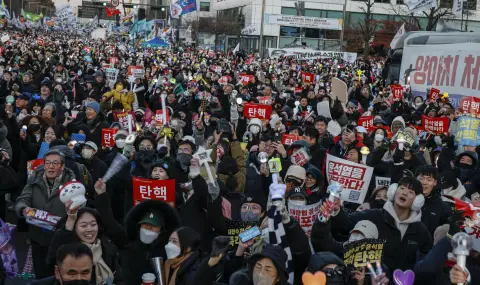After the brief declaration of martial law by the now ousted president Yoon Suk-yeol, the political crisis in South Korea is not over yet. Meanwhile, 12 members of the Conservative Party voted to impeach their party member. But it can only become a fact when the country's Supreme Court has its say. And it could be six months before that happens.
However, the largest opposition party announced that it would not file a lawsuit against interim president Han Deok-soo (who had been prime minister until then), so as not to jeopardize the functioning of the government.
US President Joe Biden is probably particularly pleased with this - since during the two years that Yun was president, the US and South Korea further deepened their alliance. At the same time, not without American pressure, Yun moved forward the issue of reconciliation with Japan. The former cruel colonial power Japan has refused to fully accept its historical responsibility for decades. Seoul recently agreed to pay compensation to the few surviving victims, mostly women who were forced to serve as prostitutes for Japanese soldiers during World War II.
Japan refuses to acknowledge the past
This move by Yun, who was already unpopular at home, made him even more unpopular. And now Washington fears that his successor could revise this policy of rapprochement. Such a change of course would not necessarily be in South Korea's interest, but from abroad it is not entirely clear why many South Koreans nevertheless insist on the following: to this day, conservative Japanese governments refuse to acknowledge the atrocities committed by imperial Japan in Korea and China.
The alliance between the two democratic neighbors South Korea and Japan is truly necessary if an effective opposition is to be made to an authoritarian China and its ruler Xi Jinping - in this respect Yun is right. It is precisely for this reason that the two countries have not only created a new format of cooperation with the United States, but also each of them is separately supporting Ukraine, which has been invaded by Russia. In response, they expect support from NATO partners in preparing for a possible battle with China.
If the new president decides to end cooperation with Japan in order to win points among the population, this will not only be a step back for US efforts in the region, but also a serious problem for the security of South Korea, Japan and Taiwan.
Why don't they like the US very much?
In North Korea, in the sinister kingdom of Kim Jong-un, they will also be watching closely to see whether Yun's successor will break ties with Japan and loosen the recently strengthened contacts with the US. The US is not popular in South Korea, and here too the reason is not immediately clear. However, let us recall that immediately after the end of World War II, before the Korean War, Washington, despite its military presence in the southern part of the Korean Peninsula, did not prevent the killings of Koreans declared communists. In 1948 and 1949, 30,000 people, ten percent of the population, were killed on Jeju Island, without the US intervening.
During the military dictatorship (1961-1979), these crimes were not to be talked about. It was only with the democratic turn in the 1980s that things changed. Finally, in 2008, a monument to the victims was erected on the island, partly as a kind of rebuke to the US. Washington still refuses to take responsibility for the events.
Partly, the negative attitude towards the US explains why a possible new political orientation of the country could once again overturn the US-favored and Yun-activated security architecture in the region. That is why political leaders are now required to be cautious.
The policy of reconciliation must continue
Yoon has greatly weakened democracy in South Korea, and his coup attempt risks him and his supporters going to prison. The new policy of reconciliation and partnership, which has barely begun, must not become collateral damage to the upcoming prosecution. Because that will only work for the enemies of freedom in Beijing and Pyongyang.
*The author Alexander Görlach is a senior fellow at the Carnegie Council on Ethics in International Affairs and a research fellow at the Internet Institute at Oxford University. He has lived in Taiwan and Hong Kong.
